WordPress custom post types (CPTs) are the best resources for structuring content in a logical and coherent manner in the CMS. To create custom post types, you can use special WordPress functions or plugins.
The second option is much easier, since it doesn’t require coding skills.
WordPress custom post types, like default post types in WordPress, can be classified into categories by creating taxonomies. Also, you can change the design, create your template, and adjust post types according to your needs.
Let’s dive deeper and consider how it’s done.
The essentials of WordPress custom post types
You usually write all your posts in the Post section of the admin panel, then assign them a category. All records of different types are in the same list, making it difficult to distinguish post types by the type of content.
Custom post types solve this problem.
WordPress CPT is an extra type of posts you create to cover the website’s goals. They allow you to sort publications by their content. The default WordPress post types are Post, Page, Media, Navigation, etc.
For example, if you have a movie review website, you’ll need several CPTs for Movies, Reviews, and others. You will have to assign them categories, like “Action” or “Romance.” By doing that, visitors will be able to conveniently see all the reviews and movies of the category.
When you register a post type, you have many settings, such as search results allowance, excerpt showcase, comments allowance, and so on.
You can also change the CPT’s labels. For example, you could rename “Add New Post” to “Add New Movie, or change the “Featured Image” label to “Add Poster.”
In our example of “Movies” and “Movie Reviews,” movie posts can also have the custom fields for parameters such as release year, director, ratings, and many others with a brief overview of the movie.
Usually, any custom field you create is available for each post type, so using the CPT plugin, you can assign the custom fields for a particular custom post type.
5 custom post types usage examples
WordPress custom post types allow you to store additional information outside the standard Post and Page WordPress entries. For example, you can create a CPT “Product” for an ecommerce store or a CPT “Job” for a job listing website.
There are some common examples of custom post types:
- “Products” for an e-commerce site — Create CPT Products and assign each item you sell to it
- “Property” CPT for traveling or booking website — Fill this CPT with post types like houses, villas, apartments, or rooms for the customers to book them
- “Services” and “Providers” for an appointment website — you can add, for example, a haircut service and specialist’s last name, and then set the relationships between the provider and service
- “Jobs” CPT on a job offers portal — add posts with the available job positions and attach them to the “Jobs CPT” you created
- “Advertisement” CPT for a Car Marketplace — each car ad is a separate post; add as many as you need and organize them in catalogs
WordPress custom post types plugins
ACF
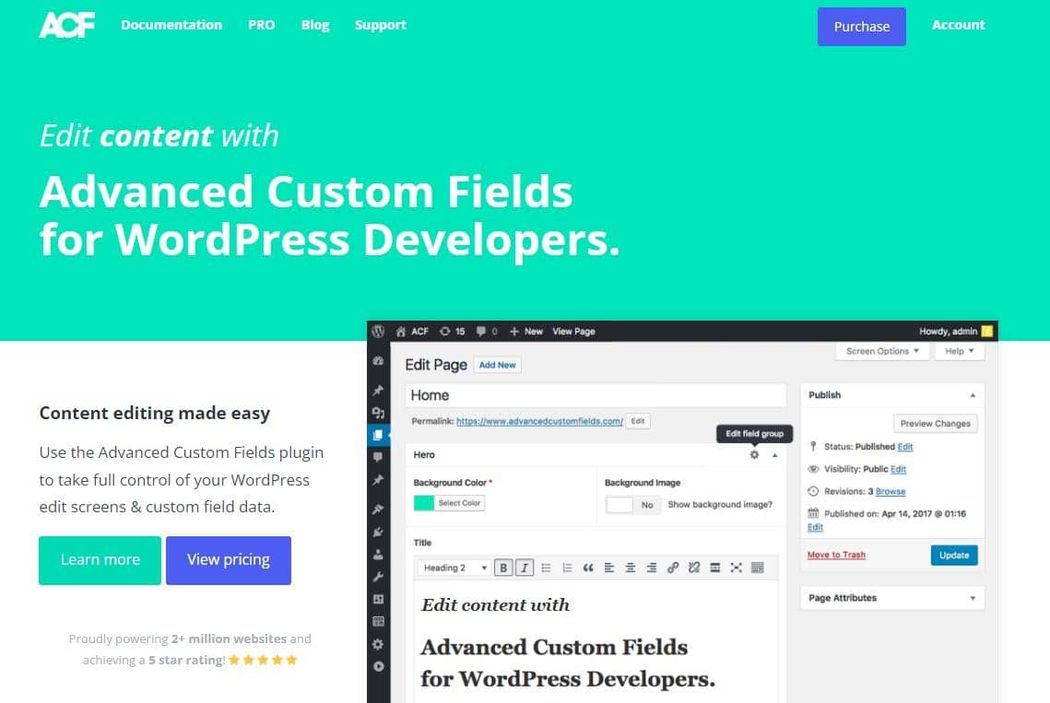
Advanced Custom Fields by Delicious Brains is a WordPress plugin that allows you to add additional custom fields when editing content.
The ACF plugin allows you to develop the site faster and simplify the process of setting up everything in the admin panel. Its main advantage is that its custom fields have a variety of flexible settings, making their creation much faster and easier.
Key features:
- Compatibility with Elementor, Gutenberg, WooCommerce and WPML Multilingual plugin
- Compatibility with WordPress 5.9 block themes
- Nav menu field adds a field to configure custom menus for posts and pages
- Sidebar selector allows you to select a registered WordPress sidebar
- Repeater field helps to create complex layouts with any number of fields
- Gallery field provides an interface for managing images
- Options page creates a custom settings page for the WordPress admin, convenient for gathering data throughout the site
- Flexible content configures multiple layouts with multiple fields that can be used in any order on the page
Cons:
- No custom post types creation option
Price: Free, but you can opt for paid version (starts from $49/year for one website)
Pods
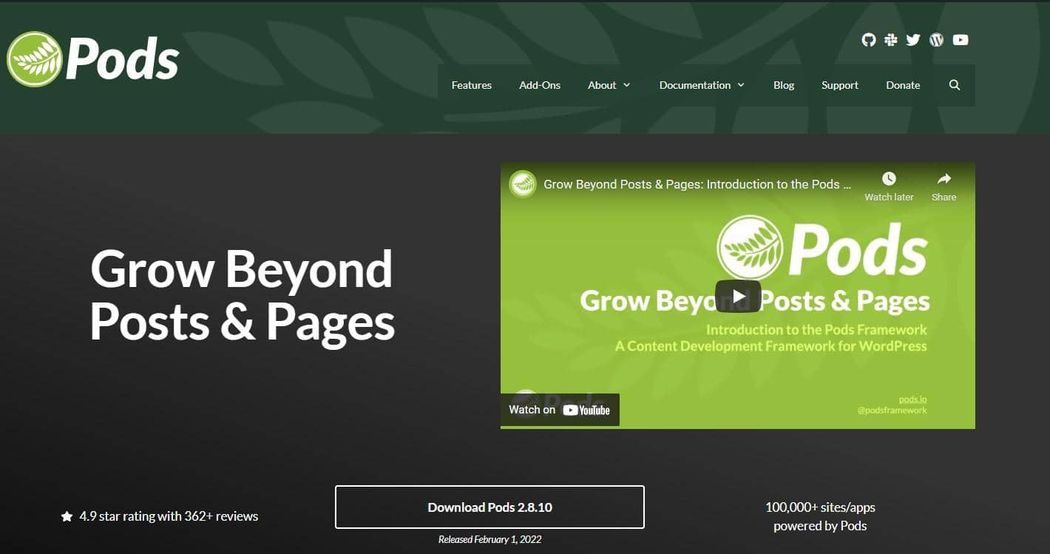
Pods is a standalone, all-in-one plugin for creating custom post types and custom fields, designed by the Pods Framework Team. It allows you to create almost any type of content, regardless of its complexity. A convenient interface helps to manage WordPress CPT and custom fields effectively.
Key features:
- A feature-rich plugin, in terms of options and a reliable solution for CPTs
- Possibility to create various types of content: custom post types, custom taxonomies, settings pages, and others
- Adding custom fields to CPTs and custom taxonomies
- Creating advanced content types that will use their own tables in the database
- Extending existing content types, such as CPTs, taxonomies, media, users, and comments
- Compatible with WordPress 5.9 block themes
Cons:
- Difficult for a beginner
- Lacks proper documentation
Price: Free or Pro addons are available
JetEngine
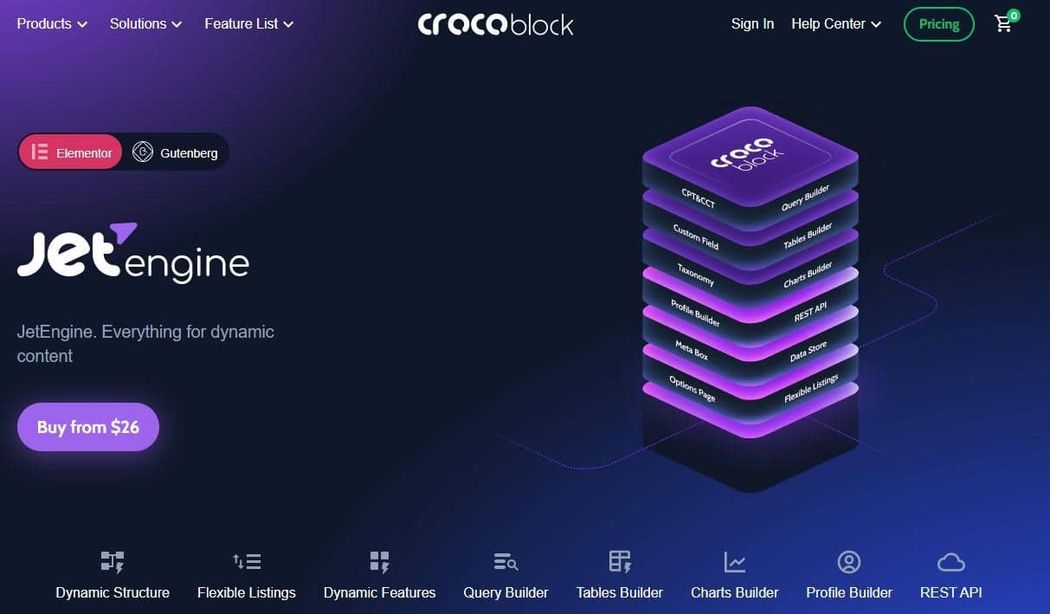
JetEngine by Crocoblock is another convenient plugin for creating custom post types, among other functions. It is compatible with Elementor, Gutenberg, WooCommerce, ACF, MetaBox, and other popular plugins.
Key features:
- Adding CPTs, along with taxonomies, custom fields, relations, and options pages. They have detailed instructions on how to add and display custom post types in WordPress with the JetEngine plugin
- Creating custom content type to save all metadata in one well-structured table
- Building advanced listings with the dynamic elements for each
- Customizing taxonomies and adding new layouts to custom post types and terms
- Displaying dynamic content conveniently
- Creating the post templates with various layouts
- A collection of dynamic content widgets, such as Dynamic Field, Meta, Image, Repeater
- Convenient drag-and-drop interface
- Compatible with WordPress 5.9 block themes
Cons:
- The documentation is a bit chaotic
- No 24/7 support, only for working days and hours
Price: Starts from $26/year for one website (with no free version available)
CPT UI
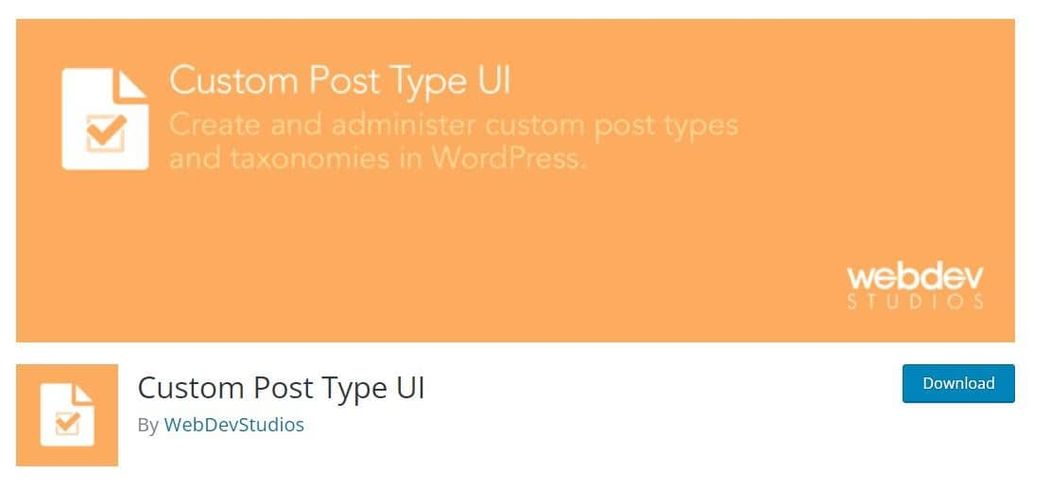
CPT UI by WebDevStudios allows you to register post types and taxonomies and manage the user-defined WordPress custom post types via the clean interface. The process is very convenient and easy.
One of the most remarkable features of this plugin is that it generates code to create custom post types that can then be inserted into the theme’s functions.php file.
Key features:
- Intuitive interface, easy-to-use solution
- Adding CPTs to default or custom taxonomies
- Support for various post editor functions
- A separate list of custom post types and taxonomies registered via the plugin
- Compatible with WordPress 5.9 block themes
Cons:
- The plugin simply creates CPTs that you need to add manually to the themes
- You can’t use taxonomies for all your post types
- The plugin lacks a description of complex capabilities
- No built-in option to add custom fields
Price: Free or Pro features available (starts at $29 per single website)
MetaBox
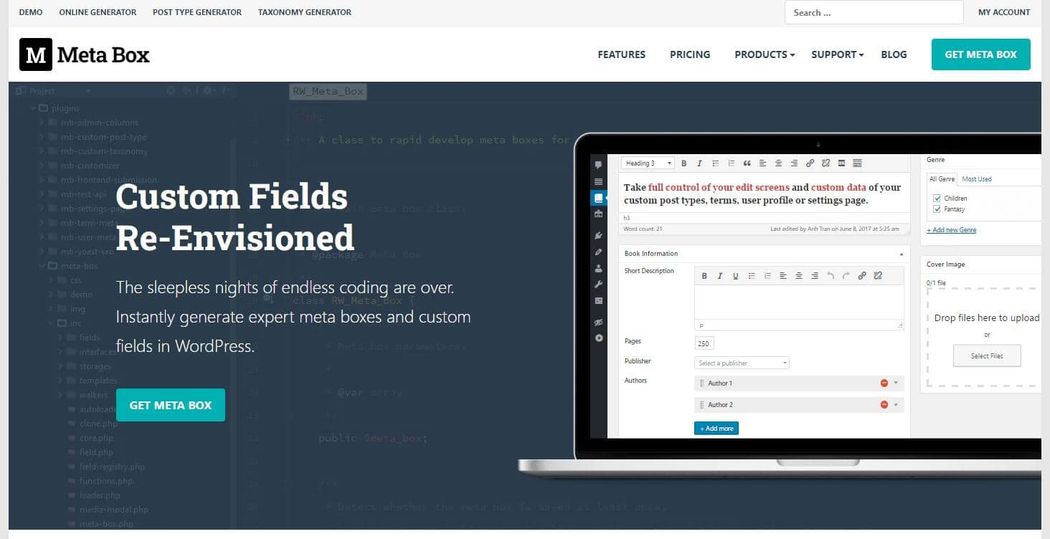
The MetaBox plugin by MetaBox.io is an elaborated and functional plugin WordPress that helps developers save a lot of time working with meta fields of all kinds, such as text, terms, comments, and users.
The plugin provides more than 40 fields and many options for each type. As a result, MetaBox allows you to create meta fields of almost any complexity.
Key features:
- Compatible with WordPress 5.9 block themes
- Creates meta fields for everything — posts, pages, post types, user profiles, taxonomies, and terms
- Repeater fields functionality for almost all types of fields
- Works with composer if you want to include a plugin in your project
- Compatible with WPML multilingual plugin
- Works on multisite
- Many hooks for implementing and changing plugin functions
Cons:
- A more complicated CPT creation workflow
- Not for beginners: you need basic PHP knowledge
Price: Starts at $49/year for one website
CPT Maker

Custom Post Type Maker by Graffino is another plugin that allows you to effortlessly create WordPress custom post types and taxonomies. It is fully integrated with the WordPress API and provides support for almost all custom post type API parameters.
Key features:
- Thoughtful interface with separate sections of custom post types and custom taxonomies
- A special interface for managing CPTs
- Allows you to specify almost all custom post type API parameters
- Uses the WordPress media uploader or dash icons
Cons:
- It doesn’t allow the output of the created custom post types and taxonomies
- It isn’t compatible with WordPress 5.9 block themes
Price: Free
Closing thoughts on WordPress custom post types
We hope this guide on WordPress custom post types was helpful. The flexibility of WordPress CPTs provides virtually unlimited possibilities for organizing a website’s content. In combination with taxonomies, you can arrange your content more effectively, set relationships, and create a complex design for your website.







